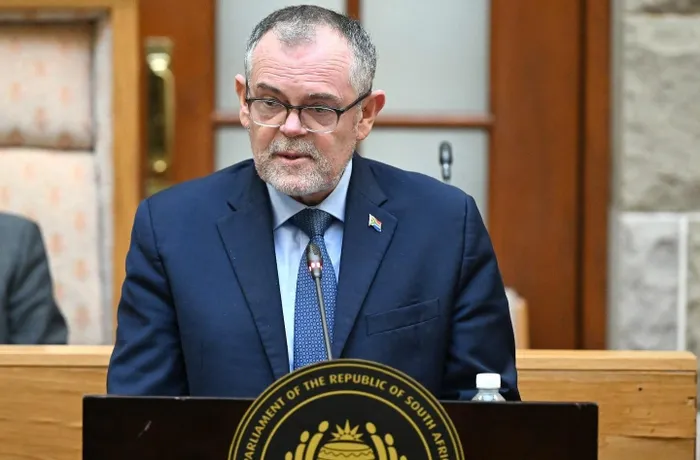Balancing ambition and action in South Africa's climate adaptation efforts
PCC

Minister of Forestry, Fisheries and the Environment, Dr Dion George.
Image: Dion George/Facebook
On Friday, the 27th June, I intently followed the 2025/26 budget vote speech by Minister Dion George of the Department of Forestry, Fisheries and the Environment (DFFE), hoping to hear a decisive shift in how South Africa intends to confront its growing climate crisis, more critically, through climate adaptation to the irreversible impacts already upon us.
The speech presented a vision of environmental stewardship, economic inclusion, and climate resilience. While the speech outlined commendable priorities such as biodiversity conservation, green job creation, and regulatory reforms, it sadly fell short in explicitly prioritising and funding climate adaptation measures with the urgency South Africa’s vulnerabilities demand.
While the DFFE’s commitments to mitigation and biodiversity are laudable, adaptation remains underfunded and overshadowed, a critical gap in a country where climate impacts are already destabilising livelihoods.
Just weeks ago, devastating floods ripped through parts of Mthatha in the Eastern Cape, tragically claiming a reported 102 lives at last count and displacing countless families some who had built informal homes on floodplains and below flood lines. These are not isolated incidents as floods are firmly becoming the biggest and most frequent climate threat to South Africa. These events are flashing red warning lights, signalingthat adaptation must be elevated to a national priority with the budget to match.
Great: A Progressive Environmental Agenda
In his speech, the Minister rightly emphasised several key priorities including the enforcement of the Climate Change Act, the revised Nationally Determined Contributions (NDCs), and Sectoral Emission Targets that demonstrate a structured approach to reducing carbon footprints. The Highveld Air Quality Management Plan is also a necessary step toward holding polluters accountable.
Regarding Biodiversity as an Economic Driver, the KISS (Kruger, Kirstenbosch, iSimangaliso) strategy and Biodiversity Economy Strategy, which aims to create 397 000 jobs and inject R127 billion annually by 2036 is a visionary linkage of conservation and economic growth. He also adds the FILLER (Fair Industry for Lions, Leopards, and Rhinos) and Fishing for Freedom, which highlights ethical wildlife management and support for small-scale fishers, crucial for both ecological and social justice.
Relating to regulatory and Financial Innovation, the RESET (Regulatory Efficiency Strategy) promises streamlined environmental governance, while the push for carboncredit monetisation could unlock new funding avenues.
These initiatives reflect a department attempting to balance ecological protection with developmental needs. However, the speech’s silence on concrete adaptation financing undermines its otherwise progressive stance.
Not so Great: Where Adaptation was Sidelined
The Minister acknowledged budget constraints, a real-term decrease of 1.4% in allocation, yet insisted the DFFE would "do more with less”. However, while cost-saving measures are prudent, adaptation cannot thrive on austerity, it must be prioritised.
What is clear is that there is no dedicated adaptation budget line. For instance, the speech mentioned a Climate Change Adaptation Response Plan for coastal regions, but without specific allocations or timelines. There also appears to be an over-reliance on international finance which we should do less of given the current geo-political uncertainties.
The Green Climate Fund’s $40 million (R717m) for South African National Biodiversity Institute is welcome, but domestic funding for localised adaptation remains vague.The Minister praised South African Weather Service for 1 400 severe weather alerts, yet many vulnerable communities still lack actionable response plans.
The speech missed an opportunity to allocate funds for local disaster preparedness (e.g., community training, evacuation routes) and the opportunities to integrate traditional knowledge with scientific early-warning systems. The elephant in the room and the unavoidable question then is: If climate change is "here and now" as the Minister says, why is adaptation not a standalone budget priority?
If the DFFE is committed to matching its rhetoric with tangible adaptation progress, it must consider elevating adaptation action to a priority stand-alone action, dedicating funding for adaptation, and providing it with the requisite institutional support for success in future budgets. It’s too elusive and the light mention gives cool comfort.
As a country, we are already paying the price of climate inaction in lives lost, livelihoods destroyed, and un-budgeted resources diverted to emergency response. Adaptation investments are cost-effective and lifesaving, especially when planned and made proactively. Every rand spent on resilient infrastructure saves many more in post-disaster reconstruction.
Minister George’s speech outlined a bold environmental agenda, particularly inmitigation and biodiversity. However, the lack of detailed, funded adaptation measures risks leaving South Africa’s most vulnerable populations exposed to escalating climate shocks. The DFFE must recognize that to achieve a truly resilient South Africa, it requires ambition, budget, and urgency for adaptation in equal measure.
This is so worrying that often when I think about adaptation and resilience action it makes me feel like we’re playing a game of ‘masicashelane’ (hide & seek), only now the count is 10 000. Minister let’s bring it back to an achievable count to a 10 please... so we can find this missing priority sooner.
The Presidential Climate Commission has consistently emphasised through its work on the just transition, adaptation is not only a technical imperative but a moral one, which is central to safeguarding livelihoods, foodsystems, and public infrastructure in the face of escalating climate threats. Initiatives like the Just Adaptation and Resilience Investment Plan demonstrate that a just, inclusive,and locally grounded adaptation pathway is possible. What’s needed now is political will and budget.

Morwesi Ramonyai Thonga is a Senior Advisor to the Presidential Climate Commission on Adaptation Finance.
Image: Supplied
Morwesi Ramonyai Thonga is a Senior Advisor to the Presidential Climate Commission on Adaptation Finance.
*** The views expressed here do not necessarily represent those of Independent Media or IOL.
BUSINESS REPORT